Polycystic ovary syndrome (PCOS) is responsible for as much as 70 percent of infertility issues in women. In fact, it is the most common hormonal problem in women of childbearing age, and yet, few women are aware of PCOS and its symptoms.
The Most Common Symptoms of Polycystic Ovary Syndrome
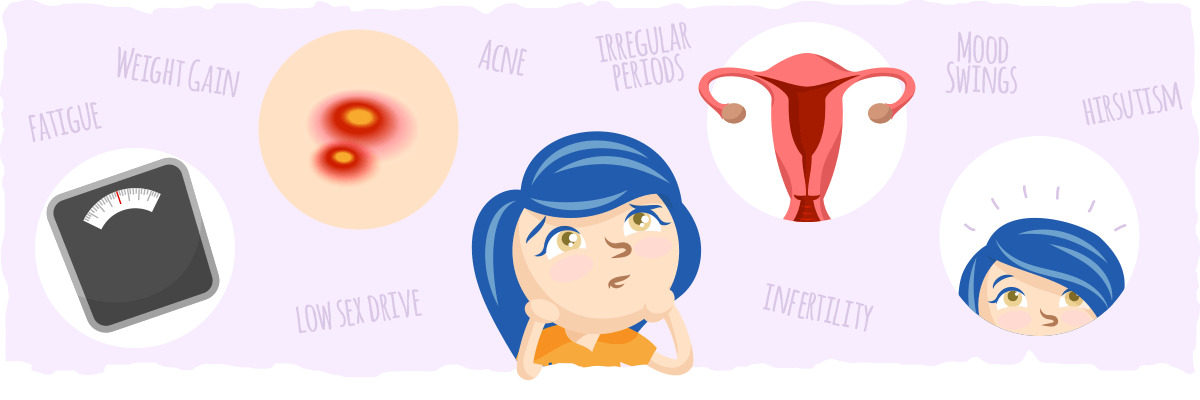
Before we explore why PCOS happens and how to reverse PCOS naturally, we must know how it affects the female body. The most common symptoms of PCOS are:
- Irregular periods, including amenorrhea (the absence of menstruation)
- Trouble conceiving a child
- Infertility
- Weight gain
- Trouble losing weight
- Acne
- Hirsutism (excessive hair growth, including in places women don’t usually grow hair, such as on the face and abdomen)
- Male pattern baldness
- Thinning hair
- Fatigue
- Mood swings
- Low sex drive
From mood swings to infertility to acne, these symptoms seem like a random assortment of things that no man or woman would ever want to experience. Could these really be a part of one disorder?
Unfortunately, this is how PCOS manifests itself. However, there is a silver lining — all of the PCOS symptoms point to the same underlying cause.
What Causes Polycystic Ovary Syndrome?
To find the underlying cause of PCOS, we must understand the nature of this disease.
The common consensus among the scientific community is that women with PCOS have an increased risk of insulin resistance, obesity, glucose intolerance, diabetes, hypertension, and dyslipidemia.
These conditions are all a manifestation of poor lifestyle choices (overeating and inactivity), but we cannot draw the same conclusion with PCOS by looking only at its associated risks.
Let’s dig into the research and see what other clues we can find. Here are some findings from the most cited studies on PCOS:

- Insulin resistance affects 65-70% of women with PCOS.
- 50% of women with PCOS are overweight or obese.
- Both obese and non-obese women with PCOS are more insulin resistant than healthy women.
- Women with PCOS have an increased prevalence of obesity.
- Fat cells in women with PCOS tend to be more insulin resistant.
- Women with PCOS tend to have higher levels of insulin.
And some interesting findings on the genetic side of the issue:
- Oligomenorrhea (infrequent menstrual periods) was more common in the mothers and sisters of women with PCOS than in women without PCOS.
- Some first degree relatives of women with PCOS are insulin resistant.
- Recent twin and family studies have suggested that insulin resistance is a genetic defect in PCOS.
Throughout these research papers, the one phrase that sticks out most is insulin resistance. It seems that insulin and insulin resistance play the most prominent role in causing PCOS. This means that putting someone with PCOS on a diet that can lower insulin levels and reduce insulin resistance— like the ketogenic diet — is best, right?
Before we jump to any conclusions, we must also consider the studies on the inheritability of PCOS. The studies found that this disorder has a genetic influence that is independent of lifestyle factor, which raises the question — are women with PCOS stuck with it?
PCOS — Inheritable, Yet Mutable
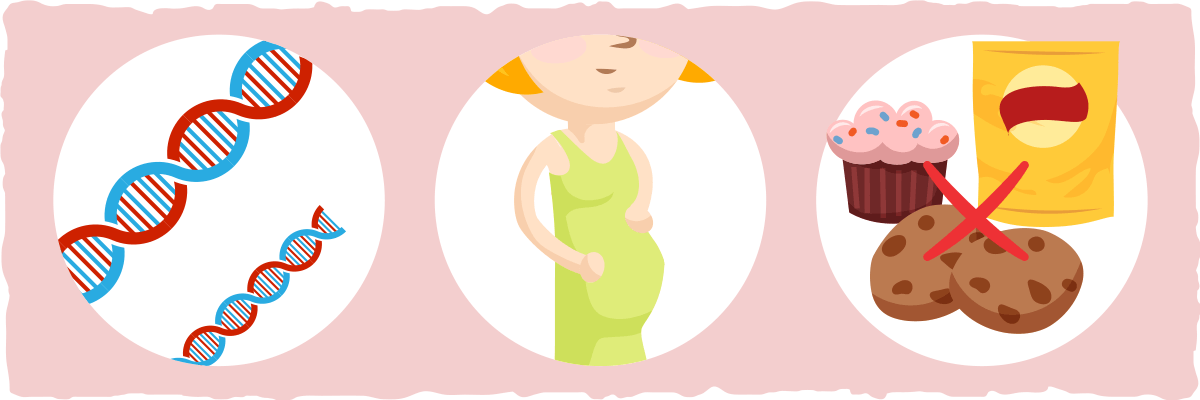
Many researchers suggest that there are specific genetic variants that contribute to PCOS. For example, a recent study by Miller and colleagues concluded that we might be able to explain the association of PCOS and insulin resistance by a single genetic defect.
Another group of researchers proposed the theory that fetal adaptations cause the genetic defect(s) that lead(s) to PCOS. In other words, if the fetus is developing inside of its mother while she is in a stressful environment (i.e., lacking adequate food), then the fetus will undergo genetic changes to help it adapt to that stressful environment.
One of these genetic adaptations is insulin resistance. Although insulin resistance is associated with PCOS, heart disease, obesity, and type 2 diabetes, it is useful when food is scarce because it keeps energy in the blood for a longer duration, so it can reach the cells that need it most.
However, many of us live in environments with food abundance. Chips, cookies, cakes, or any other food you desire can touch your taste buds within 30 minutes of thinking about it. This combination of insulin resistance and excess calorie consumption is a recipe for chronic disease.
But what exactly does this have to do with women who have PCOS?
Scientists theorize that some women develop a particular type of insulin resistance that turns off their fertility cycle and increases their testosterone levels to improve their chances of survival. However, this may only cause PCOS symptoms when the woman is chronically stressed, overeats, or is sedentary.
In other words, PCOS genes are inheritable, but having them doesn’t mean that you will be infertile. Later, we will find out how to turn fertility on (and PCOS off), but first, let’s figure out how PCOS happens.
How Insulin Resistance Causes PCOS
Earlier we found out that women with PCOS tend to have higher levels of insulin and insulin resistance. Elevated levels of insulin cause the ovaries to produce more androgens (like testosterone). Insulin also decreases the production of sex-hormone binding globulin — a glycoprotein that prevents testosterone from freely entering cells.
With more androgen production and less sex-hormone binding globulin, free testosterone can freely float through the blood and interact with cells. This can cause hair growth on the chest and face, mood swings, fatigue, low sex drive, acne, and other PCOS symptoms.
As androgen levels continue to increase, they stimulate 5-alpha reductase activity — an enzyme that converts testosterone to a more potent metabolite called dihydrotestosterone. This makes PCOS symptoms even worse.
Genetics can set the stage for this to happen, but PCOS will not progress without the presence of high insulin levels and insulin resistance. To create a chronic state of insulin resistance and hyperinsulinemia, it takes a combination of poor lifestyle habits.
The Lifestyle Factors That Cause PCOS
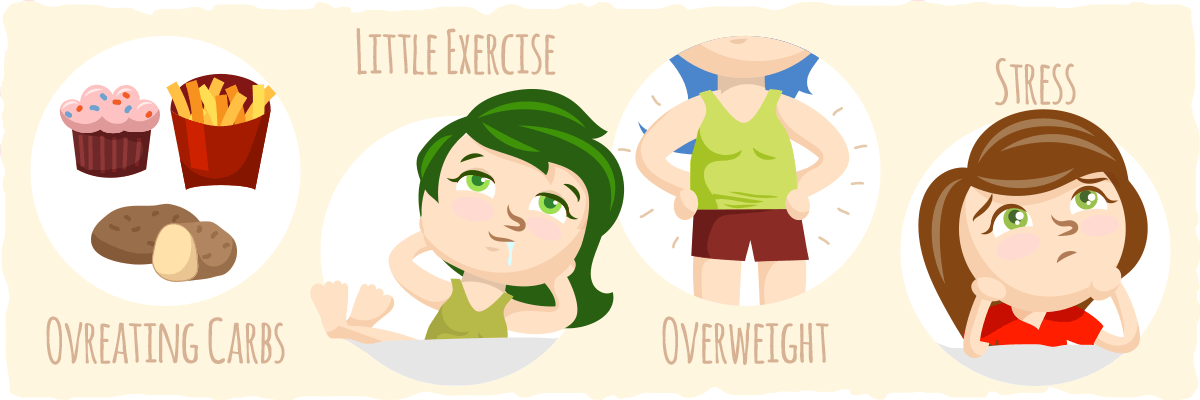
It is possible to prevent PCOS (or keep it from getting worse) by avoiding these things:
- High-carbohydrate foods
- Excess calorie consumption
- Chronic stress
- Inappropriate level of physical activity, whether too high or too low
- Exposure to endocrine-disrupting chemicals (e.g., Bisphenol A, 4-methylbenzylidene, Methylparaben, Nicotine, Sodium Fluoride, PBDEs/PCBs, and Perchlorate )
- Having a high percentage of body fat (being overweight or obese)
- Having a low percentage of body fat due to unhealthy calorie restriction
Each one of these factors contributes to PCOS in some way. High carbohydrate foods, excess calorie consumption, and inactivity increase insulin levels and insulin resistance. Chronic stress, over-exercising, and having a low body fat percentage increases cortisol levels, creating more insulin resistance.
The least obvious contributors to PCOS are endocrine-disrupting chemicals. These chemicals can cause hormonal imbalances that lead to PCOS, so it is important to avoid consuming them or putting them on your skin.
However, it is important to realize that avoiding these seven contributors to PCOS may not completely reverse the disorder. To get the best results, we need to follow a diet that addresses the underlying causes of PCOS.
Is There a PCOS Diet? The Benefits of Coupling Keto and PCOS
The scientific literature on diets for PCOS is sparse. However, the researchers of a treatment review suggest that PCOS women will do best by eating complex carbohydrates and avoiding sugar. This suggestion was confirmed in one study on the effects of low-glycemic index diet on women with PCOS, but the results are unimpressive when compared to a similar study that was done on the ketogenic diet.
In this study, five overweight women ate a ketogenic diet (20 grams of carbohydrates or less per day) for 24 weeks. The results were astounding — average weight loss was 12%, free testosterone decreased by 22%, and fasting insulin levels dropped by 54%. What’s even more impressive is that two of the women became pregnant despite previous infertility problems.
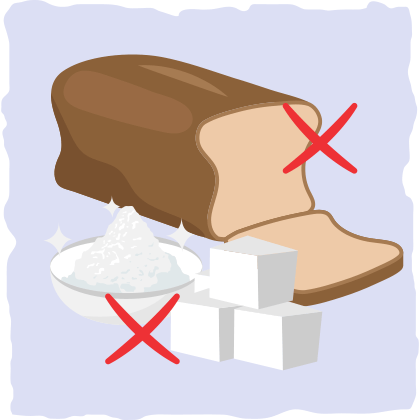
This provides us with preliminary evidence that the ketogenic diet may be effective in treating PCOS. However, this finding is not surprising.
Ketogenic diets have been shown in many different groups of people, from healthy subjects to type 2 diabetic patients, to improve insulin levels and reduce insulin resistance — two things that would also help women with PCOS. Ketogenic diets also produce rapid weight loss, which is essential for improving fertility in obese women with PCOS.
However, there is one important caveat with women and the ketogenic diet. The restriction of carbohydrates on the ketogenic diet may increase stress levels and contribute to insulin resistance. This is why it is important to follow the ketogenic diet, with minor variations if needed.
How to Treat PCOS Naturally: The New And Improved PCOS Diet
A simple ketogenic diet can help many women reverse their PCOS. For some women, however, carbohydrate restriction may cause excess stress and keep them from getting results. This is why it is important to follow these guidelines to create the right PCOS diet for you:
1. Restrict Carbohydrates
We recommend starting with below 35g total carbs per day. If this makes symptoms worse after a couple of weeks, then increase your carbohydrate consumption by 5-10 grams per day until you find a sweet spot where you have energy and feel better. From your new carbohydrate intake level, try reducing your intake by 5-10 grams per day to increase your ketone levels and fat burning capacity.

2. Eat High-Fiber Vegetables With Every Meal
High-fiber vegetables, like broccoli, kale, and spinach, can help combat insulin resistance and reduce inflammation. Have them with every meal for best results.
For more on what vegetables to eat and how to add them to your diet, check out our low-carbohydrate vegetable guide
3. Eat The Right Amount of Protein
Use our keto calculator to find out what your daily protein intake should be.
4. Eat Enough Calories to Achieve Your Ideal Weight
Once again, use our keto calculator to estimate your ideal daily calorie intake. If you have an unhealthily low body fat percentage, then make sure you are eating more calories than you need to maintain your weight. If you are overweight or obese, then you need to maintain a calorie deficit to lose weight.
One Year of Keto for PCOS: A Case Study & Success Story
By following those four simple dietary guidelines, you can lower your insulin levels, balance your hormones, and reverse most PCOS symptoms. To give you a better idea of what is possible when you make this switch, we asked Beth to share her PCOS success story with us.
Before learning about the keto diet, she had experimented with various forms of exercise and diet approaches, but nothing provided lasting results.
Despite being failed by so many promising weight loss programs, Beth decided to give keto a chance with the help of a 30-day Ruled.me diet plan. All it took was four days before she felt a significant increase in energy and vitality.
Several weeks later, her confidence in keto was solidified as she saw her dangerously high triglycerides and insulin resistance measures drop down to normal levels. (And this was only the beginning of her health transformation.)
After one year of keto eating, Beth was down 60 pounds, and the PCOS symptoms that plagued her throughout her entire adult life were gone!
These results provide us with the perfect example of what’s possible — but Beth’s journey doesn’t stop there. To continue her progress, she began focusing on the other crucial aspects of a healthy, PCOS-reversing lifestyle.
The Lifestyle That Helps Reverse PCOS
Combining a vegetable-rich ketogenic diet with exercise, sleep, and meditation is one of the most efficient ways to reverse PCOS.
Exercise
What kind of exercise should you do? It’s up to you. Many different types of exercise have been found to help women with PCOS, including:
Resistance Training
In a 4-week study, performing resistance training three times a week led to lower androgen and sex-hormone binding globulin levels, weight loss, and increased muscle mass in women with PCOS.

Aerobic Exercise
Aerobic exercise has been shown to help lower inflammation, reduce insulin resistance, promote weight loss, and improve reproductive function in women with PCOS. In one study, 56% of women with amenorrhea who performed aerobic exercise for 12 weeks began menstruating again. These results are pretty amazing, and only aerobic exercise is to blame.
Yoga
Based on research in adolescents with PCOS, practicing yoga seems to improve reproductive hormone levels, insulin resistance, and cardiovascular disease risk factors. It also helps reduce stress levels and enhance the quality of life.
No matter what type of activity you choose to do, PCOS researchers recommend getting at least 30 minutes of low to moderate intensity exercises, like yoga, cycling, or a brisk walk, every day. (Add in resistance training, three days a week, for even better results.)
Another important thing you need to prioritize is stress reduction. The more stressed you are, the more insulin resistant your cells will be. This will cause an increase in insulin levels and PCOS symptoms.
Sleep
The most efficient way to reduce stress levels is with sleep. However, quality sleep is harder to come by for most women with PCOS. In a review published in Human Reproduction, researchers found that “sleep disturbances were twice as common in women with PCOS compared with those without,” and women with PCOS especially had difficulty falling asleep.
The good news for women with PCOS is that the sleep disturbances will most likely be cleared up by the diet and lifestyle adjustments suggested in this article. However, if getting 7-9 hours of restful sleep is still an issue, then meditation will help tremendously.

Meditation
Studies have shown that meditation lowers cortisol levels and improves blood sugar biomarkers, which leads to a reduction in insulin resistance and insulin secretion. Meditating 30 minutes before you plan on going to sleep is a great way to improve sleep quality and reduce stress at the same time.
Putting It All Together — The Ideal Diet and Lifestyle for Women with PCOS
The combination of the ketogenic diet, exercise, quality sleep, and meditation addresses one of the main causes of PCOS (insulin resistance) in many ways. The ketogenic diet limits the most potent stimulator of insulin secretion — carbohydrates. Exercise makes the cells more sensitive to insulin and improves body composition and hormonal levels. Quality sleep and meditation lower cortisol levels, improving insulin sensitivity and quality of life.
Oops, did I lose you? Here’s a simple breakdown of the ideal PCOS diet and lifestyle:
- Restrict carbohydrates
- Eat high-fiber, low-carbohydrate vegetables with each meal
- Eat the right amount of protein every day (use our keto calculator to find out what that is for you)
- Eat enough calories to achieve your ideal weight (once again, the keto calculator will help you find that out)
- Exercise for at least 30 minutes every day
- Meditate every night before sleep
- Make sure you are getting 7-9 hours of sleep every night
- If you need further help with reversing PCOS, consider using some natural supplements.
Natural Supplements That Help With PCOS
There are plenty of supplements that can help reverse PCOS is many different ways, from reducing testosterone levels to improving insulin resistance. Here are the eleven best supplements that help with PCOS:
Flax Seeds
Flax seeds are known to increase sex-hormone binding globulin levels and reduce androgen and insulin levels, making it an ideal supplement for women with PCOS.
A recent meta-analysis of 45 randomized placebo-controlled trials on flax seed supplementation also found that flax seeds help people lose weight and inches off the waist. They achieved this result with a daily dose of ~2.5 tablespoons of whole flax seeds.
Here are some ways to add flaxseeds to your diet:
- Put them on top of a salad
- Blend them into your protein shake or smoothie
- Make a seed butter snack with them by grinding a couple of tablespoons of flax seeds into a powder and blending some melted coconut oil, low-calorie sweetener, and cinnamon into it.
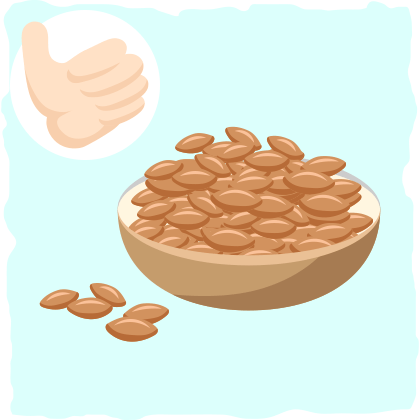
Cinnamon
Many high-quality studies suggest that cinnamon helps reduce insulin resistance and restore ovarian function in women with PCOS. To get these benefits, ½ to 1 teaspoon per day is all you need. Blend the cinnamon into your flax seed butter, and add some nuts for even more of a health boost.
Nuts
Nuts are a healthy addition to any diet (as long as you are not allergic to them). Walnuts and almonds, in particular, have the most beneficial effect on women with PCOS. For example, walnuts increase sex hormone-binding globulin, while almonds decrease free androgen levels.
This means that these nuts address the cause of many PCOS symptoms. The next dietary supplement on this list, however, gets to the underlying cause of PCOS — insulin resistance.
Berberine
This compound is found in herbs like goldenseal, barberry, and Oregon grape root, and it has been used in Chinese medicine for centuries to treat a variety of health conditions.
In one impressive study, berberine was found to reduce insulin resistance as effectively as metformin, a medication frequently prescribed for PCOS. Berberine also led to slightly more weight and belly fat loss, a greater increase in sex-hormone binding globulin levels, and lower levels of free testosterone than an equivalent dosage of metformin. In other words, this natural compound is more effective than one of the most popularly prescribed PCOS medications.
The recommended dose for berberine is 500 mg taken 2-3 times per day.
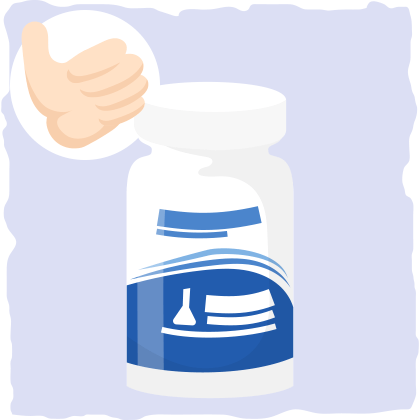
Something else to consider is taking it with milk thistle or coconut oil. Milk thistle and capric acid (a fatty acid in coconut oil) may increase the absorption of berberine.
Apple Cider Vinegar
Apple cider vinegar has been shown to increase insulin sensitivity in several studies, including a trial in women with PCOS. In this trial, seven women with PCOS took one tablespoon of apple cider vinegar per day. After 40 days, 4 of the women resumed ovulating, 6 experienced a measurable reduction in insulin resistance, and 5 had a decrease in their LH/FSH ratio (this indicates less androgen production).
For best results, consume 1-2 tablespoons per day. However, this doesn’t mean you have to take shots of pure vinegar. Use apple cider vinegar as the vinegar for your salad dressings and sauces instead.
Magnesium
Magnesium deficiencies are the second most common deficiency in developed countries. Magnesium is important for women with PCOS because magnesium deficiency reduces insulin sensitivity and increases nerve excitability, leading to more stress, more tension, and more PCOS symptoms.
When it comes to magnesium supplements, magnesium citrate is most popular. It’s well absorbed but may have a mild laxative effect in some sensitive people. For the people who are sensitive to magnesium citrate, magnesium bisglycinate is the best option.
Regardless of which supplement you choose, make sure you are getting around 310 mg of magnesium per day if you are a woman.
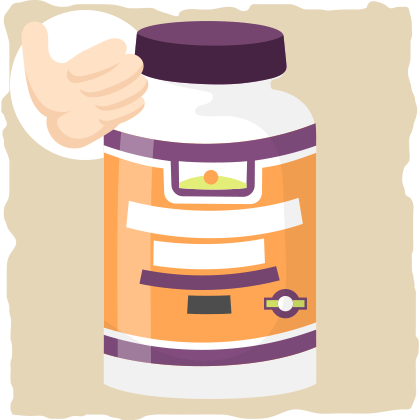
Zinc
Zinc is essential for the functioning of enzymes, hormones, and the immune system. A deficiency in zinc can cause a hormonal imbalance and make PCOS worse, while zinc supplementation can reduce some of the symptoms of PCOS.
This was confirmed in one study that found that zinc was able to reverse facial and chest hair growth in women with PCOS. The dosage they used was 220 mg per day of zinc sulfate, which is equivalent to 50 mg of elemental zinc per day.
Inositol
One of the most well-studied PCOS supplements is inositol, a sugar alcohol chemical compound found in keto-friendly foods like citrus fruits and nuts.
Multiple studies have shown that inositol supplementation may improve insulin resistance and decrease male hormones in the bloodstream. Most notably, inositol seems to promote ovulation and fertility.
In one study, only 6 percent of control group participants experienced menstrual cycles versus 86 percent in the inositol group (a finding confirmed by follow-up research).
Most studies conclude that, at doses between 1,200-2,400 milligrams per day, inositol can significantly improve PCOS symptoms.
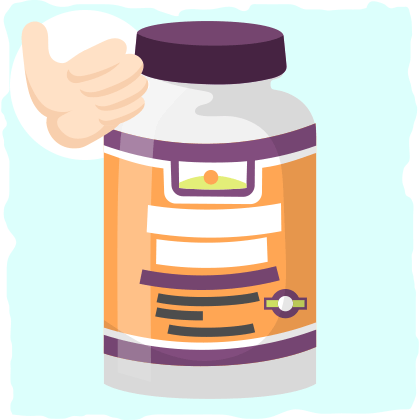
Chasteberry (commonly known as Vitex)
Chasteberry helps restore the balance between many hormones involved in the menstrual cycle. It does this by lowering prolactin levels. This can help women with oligo/amenorrhea and infertility, which has been confirmed in three randomized control trials. However, some women with PCOS may not benefit from taking chasteberry if their prolactin levels are within normal ranges.
Reishi Mushroom
Reishi mushroom can help reduce stress levels and inhibit 5-alpha reductase, an enzyme that converts testosterone to dihydrotestosterone. There are no studies on the effects that reishi mushroom has on women with PCOS, but its ability to inhibit the production of dihydrotestosterone and reduce stress make it a promising supplement for PCOS.
Vitamin B9
For women with PCOS that want to get pregnant, vitamin b9 is essential.
To improve fertility, researchers suggest that women who are at a healthy weight should take 400 micrograms of folic acid (one of the many forms of vitamin b9), and obese or overweight women should take 5 mg of folic acid.
If supplementing with folic acid makes you feel worse, then try supplementing with L-methylfolate or 5-methyltetrahydrofolate (5-MTHF). You also can get plenty of folate by eating broccoli, cauliflower, asparagus, kale, spinach, and cabbage.
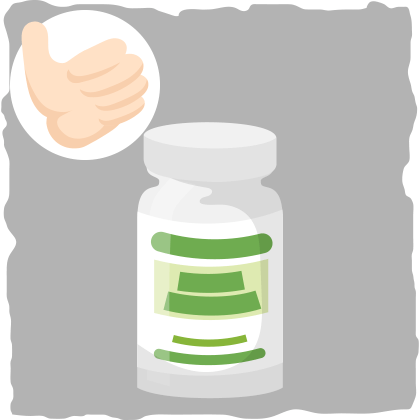
The Takeaway
Polycystic ovary syndrome (PCOS) is responsible for as much as 70 percent of infertility issues in women. On top of that, it causes symptoms like acne, male-pattern baldness, mood swings, weight gain, and fatigue, making it a difficult disorder to have.
Fortunately, you can reverse PCOS with the right combination of diet, exercise, sleep, and meditation. The ketogenic diet, for example, may be one of the best diets for women with PCOS because it reduces insulin levels and insulin resistance (one of the main causes of PCOS).
When you combine the ketogenic diet with 30 minutes of daily exercise, 7 to 9 hours of quality sleep every night, and daily meditation, it is highly unlikely you will still have or ever get PCOS.

If you are struggling with the new diet and lifestyle, you can use various supplements to help. By supplementing with extra carbohydrate consumption in small amounts and taking magnesium and Reishi mushroom, you can relieve stress that may be making PCOS worse. Inositol, zinc, apple cider vinegar, cinnamon, flaxseeds, and berberine are other natural dietary supplements that can help improve your health and PCOS symptoms more quickly as well.
Throughout the process of reversing PCOS, make sure you consult with your doctor. He/she can order different blood tests that will confirm how well your new diet and lifestyle are working for you.
Sources:
- Insulin Resistance and the Polycystic Ovary Syndrome: Mechanism and Implications for Pathogenesis — Oxford Academic
- Can My Diet Relieve Symptoms of Polycystic Ovary Syndrome (PCOS)? — Healthline
- Polycystic Ovary Syndrome (PCOS) — Deep Dyve
- Beyond weight loss: a review of the therapeutic uses of very-low-carbohydrate (ketogenic) diets. — NCBI
- The effects of a low-carbohydrate, ketogenic diet on the polycystic ovary syndrome: A pilot study — BioMed Central
- Dietary Composition in the Treatment of Polycystic Ovary Syndrome: A Systematic Review to Inform Evidence-Based Guidelines — Science Direct
- 1 Cause of Infertility? Polycystic Ovarian Syndrome — Dr. Axe
- Herbal medicine for the management of polycystic ovary syndrome (PCOS) and associated oligo/amenorrhoea and hyperandrogenism; a review of the laboratory evidence for effects with corroborative clinical findings. — NCBI
- Chaste tree (Vitex agnus-castus)–pharmacology and clinical indications. — NCBI
- Effects of Zinc Supplementation on Endocrine Outcomes in Women with Polycystic Ovary Syndrome: a Randomized, Double-Blind, Placebo-Controlled Trial. — NCBI
- Anti-androgenic activities of Ganoderma lucidum. — NCBI
- Cortisol-Induced Insulin Resistance in Man: Impaired Suppression of Glucose Production and Stimulation of Glucose Utilization due to a Postreceptor Defect of Insulin Action — Oxford Academic
- Abdominal fat and what to do about it — Harvard Health Publications
- State of the science of endocrine disrupting chemicals – 2012 — World Health Organization
- Effect of a low glycemic index compared with a conventional healthy diet on polycystic ovary syndrome — American Journal of Clinical Nutrition
- The Effect of Flaxseed Supplementation on Hormonal Levels Associated with Polycystic Ovarian Syndrome: A Case Study — NCBI
- Differential effects of walnuts vs almonds on improving metabolic and endocrine parameters in PCOS. — NCBI
- MINDFULNESS-BASED STRESS REDUCTION IS ASSOCIATED WITH IMPROVED GLYCEMIC CONTROL IN TYPE 2 DIABETES MELLITUS: A PILOT STUDY — ProQuest
- Effect of buddhist meditation on serum cortisol and total protein levels, blood pressure, pulse rate, lung volume and reaction time — Science Direct
- The effect of flaxseed supplementation on body weight and body composition: a systematic review and meta-analysis of 45 randomized placebo-controlled trials — Wiley Online Library
- The Effect of Flaxseed Supplementation on Hormonal Levels Associated with Polycystic Ovarian Syndrome: A Case Study — NCBI
- Sleep Duration, Exercise, Shift Work and Polycystic Ovarian Syndrome-Related Outcomes in a Healthy Population: A Cross-Sectional Study. — NCBI
- Sleep disturbances in a community-based sample of women with polycystic ovary syndrome. — NCBI
- Effect of a yoga program on glucose metabolism and blood lipid levels in adolescent girls with polycystic ovary syndrome. — NCBI
- Effects of a holistic yoga program on endocrine parameters in adolescents with polycystic ovarian syndrome: a randomized controlled trial. — NCBI
- Effects of supervised aerobic training on the levels of anti-Mullerian hormone and adiposity measures in women with normo-ovulatory and polycystic ovary syndrome. — NCBI
- Resistance Exercise Impacts Lean Muscle Mass in Women with Polycystic Ovary Syndrome. — NCBI
- A clinical study on the short-term effect of berberine in comparison to metformin on the metabolic characteristics of women with polycystic ovary syndrome. — NCBI
- Berberine — Examine
- An Update on Plant Derived Anti-Androgens — NCBI
- The effect of cinnamon extract on insulin resistance parameters in polycystic ovary syndrome: a pilot study — Fertility and Sterility
- Preliminary evidence that cinnamon improves menstrual cyclicity in women with polycystic ovary syndrome: a randomized controlled trial — AJOG
- Sodium caprate augments the hypoglycemic effect of berberine via AMPK in inhibiting hepatic gluconeogenesis. — NCBI
- Magnesium — Examine
- Zinc — Examine
